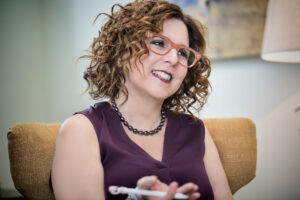Leading the Way in Legal Tech Education – with Cari M. Pines, CFLS

Cari M. Pines, CFLS, is the founder of Pines Law Group, dedicated to the practice of family law. In addition to her focus on electronic evidence, she specializes in representing parents and children in family law matters impacted by a child’s special needs, consults with other attorneys in this area, and lectures regularly on this subject. Cari served as Chair for the Family Law Section of Los Angeles County Bar Association. Via her role as a LevittQuinn board member, Cari has led LQ’s programming in cutting edge tech training for the family law community.
HOW IT ALL STARTED
My interest in legal technology, which has been the key to weathering the COVID-19 storm, came as the natural progression from learning all I could about family law ESI. Up through 2015, family law attorneys regarded the concept of “ESI” (electronically stored information) as nothing more than an esoteric concept native only to a complex civil litigation practice. The first time I even heard the term “ESI” was in an Attorney Briefcase flyer for a program taught by Gordon Cruse and the late Jim Hennenhoeffer. I registered for my first ESI program only after the State Bar issued the 2015 Ethics Opinion threatening that we if we didn’t learn ESI or associate in an attorney who does, we aren’t competent to practice family law where nearly all of the evidence is electronic.
It soon became clear to a very small number of us that there was no better breeding ground for social media evidence, email communication or instant messages than family law litigation. Where else do you see litigants texting their children from counsel table creating volumes of evidence before your very eyes? Cruse and Hennenhoeffer taught us the “what’s” and “why’s” of ESI but Kevin Mooney and I then set out to learn the “how’s” of ESI.
ESI EDUCATION TAKES OFF
My addiction was soon fueled by the expansion of ESI to include nuanced electronic methods of domestic violence and coercive control, First Amendment concerns about free speech and privacy and the need in family law matters for electronic discovery to see just how far our digital footprints could take us in a support, custody or property division scenario.
On 12.5.15, LQ joined us on our mission and we hosted the first full day ESI program for family law professionals “From Consult to Trial: Demystifying the Preservation, Collection and Presentation of ESI in Family Law” on a sound stage at Raleigh Studios featuring one of the ESI experts, Tom O’Connor from New Orleans. Not only did we have a live band playing during the lunch hour, but we had our first visit by the In-and-Out truck.
In 2016, we launched an effort to teach the nuts and bolts of doing ESI exercises with the nation’s leading ESI guru, Craig Ball from the University of Texas, who joined Tom O’Connor, Cruse, and Hennehoeffer, along with local judges and leaders (and the In and Out truck) for our second full-day ESI presentation, “ESI 2.0 Managing Electronically Stored Information and E-Discovery in Family Law” at Pepperdine Law School.
Legal technology became our focus when we confronted the challenges of present emails, internet-based data and audio/video exhibits in a courtroom. Off we went to Chicago for the ABA Tech Show and Orlando for MacTrack for a few years to find the leaders in these fields and test the best of what legal technology had to offer. Fortunately, we spent days walking the exhibit halls and listening to panels taught by the nation’s leading legal technology experts — only to find that we were already using the same apps and processes that the most tech-savvy attorneys in the country were using.
Our third large-scale ESI presentation, mirroring our ESI journey, was FAMTech LA 2018, in July at the Japanese American National Museum where we hosted a full-scale Family Law legal tech show featuring panel presentations and exhibit booths with family law-relevant legal tech vendors.
COVID 19’S IMPACT ON LEGAL TECH
While trekking across the country in search of better, attorney-friendly tech options, we had to confront the reality that most of us rely heavily on our desktop PCs, our secretary’s ability to format our pleadings, our land-line phone systems, and paper files. We launched the “Practically Paperless” courses for LQ in 2018/19 to light a fire under the Aeron chairs of family law attorneys to show them how much we could accomplish on an iPad alone.
At the dawn of my ESI education in 2015, I would joke that it was the “wild west” of electronic evidence because it would take people at least five years to realize the danger and extent of their digital footprint. When I started teaching legal tech, I would say that in five years, we would all be in a position to work remotely without staff and make virtual court appearances with digital evidence presentation. It might be time for me to stop making predictions.
